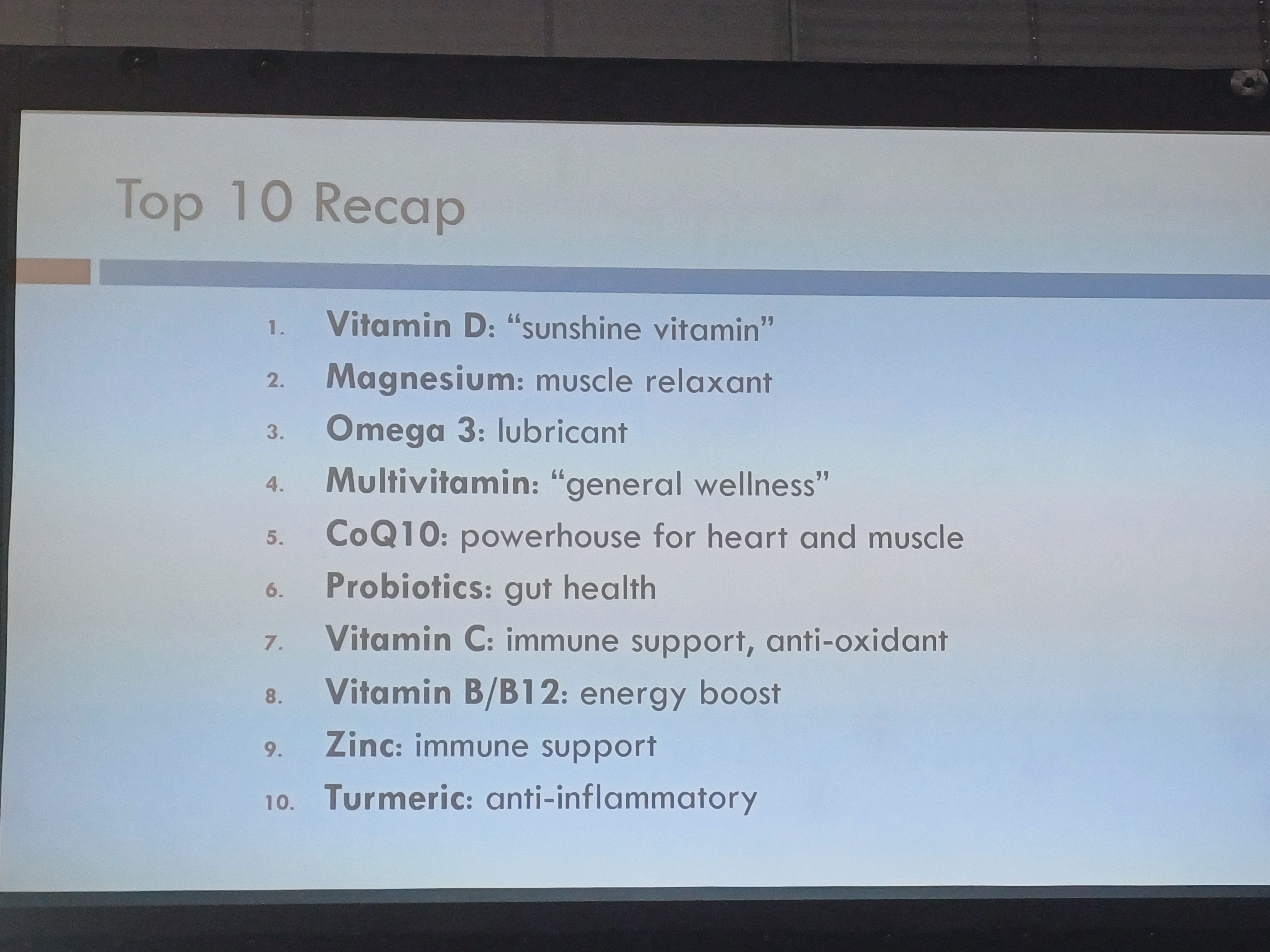🧠 Top 13 Supplements: What They’re For, What the Research Says, and What to Watch Out For
Recently, I attended a fascinating talk at the GP Conference by an Integrative Medicine Doctor. She shared her list of the top supplements she recommends in clinical practice—something I thought many of you would love to hear more about.
Her key message? A well-balanced, nutrient-rich diet is still the best source of vitamins and minerals. In fact, she personally only takes three supplements:
-
A good multivitamin
-
Cod liver oil (for omega-3s and vitamin A/D)
-
And vitamin C when she feels a cold coming on.
I personally add a probiotic like kefir into this mix, as I have found that has been very beneficial to my gut health and skin.
She also stressed that supplements should be used to fill gaps—not replace good nutrition or lifestyle habits.
Inspired by her list (with a few additions of research into the most commonly used supplements), here’s a practical guide to the Top 13 Supplements—what they’re used for, the evidence behind them, and cautions to keep in mind.
🥇 The Top 13 Supplements
1. Vitamin D3
Uses: Immunity, bone health, mood, hormonal balance
Evidence: Linked to reduced risk of respiratory infections and improved bone density
Caution: Fat-soluble—avoid over-supplementation. Best taken with vitamin K2
2. Magnesium
Uses: Sleep, anxiety, muscle cramps, migraines, heart rhythm, and bowel regularity
Evidence: Improves sleep quality, reduces migraine frequency, supports stress resilience
Caution: Can cause diarrhea in high doses; interacts with some medications like diuretics
3. Omega-3 Fatty Acids (Fish Oil / Cod Liver Oil / Algal Oil)
Uses: Brain health, inflammation, heart disease, mood, ADHD
Evidence: Reduces cardiovascular risk (VITAL study), supports brain and eye development, lowers inflammation
Caution: Can thin the blood; choose high-quality, mercury-free sources
4. Multivitamins
Uses: General health, filling dietary gaps, energy
Evidence: COSMOS trial showed memory improvements in older adults; prevents deficiencies in restricted diets
Caution: Look for high-quality multis with active forms of nutrients; avoid megadoses
5. CoQ10 (Coenzyme Q10)
Uses: Energy, heart health, statin side effects, migraine prevention, fertility
Evidence: Helps reduce statin-related muscle pain, improves mitochondrial energy output
Caution: May interact with blood pressure or blood thinning meds; take with fat for absorption
6. Probiotics
Uses: Gut health, mood, IBS, immunity, skin
Evidence: Specific strains reduce bloating, IBS symptoms, and may support mood via the gut-brain axis
Caution: Choose clinically studied strains; not always appropriate for immunocompromised people
7. Vitamin C
Uses: Immunity, antioxidant support, collagen formation, iron absorption
Evidence: Shortens cold duration in active people; boosts antioxidant levels
Caution: Very high doses can cause loose bowels or kidney stones
8. B-Complex Vitamins
Uses: Energy, nervous system function, stress, anemia
Evidence: Improves energy and mental clarity, especially under stress
Caution: B6 in high doses can cause nerve symptoms; choose methylated forms if possible
9. Zinc
Uses: Immunity, skin health, wound healing, fertility
Evidence: Shortens duration of colds, improves acne and sperm quality
Caution: Too much can deplete copper; use short-term unless guided
10. Curcumin (Turmeric Extract)
Uses: Joint pain, inflammation, mood, metabolic health
Evidence: Comparable to NSAIDs for joint pain; mood-enhancing properties shown in depression
Caution: Poor absorption unless combined with black pepper; can interact with blood thinners
11. Collagen Peptides
Uses: Skin health, joint pain, gut lining support
Evidence: Improves skin elasticity and hydration; may help joint mobility
Caution: Sourced from animals—be mindful of allergies and quality
12. Ashwagandha
Uses: Stress, anxiety, sleep, adrenal support, thyroid health
Evidence: Lowers cortisol, improves stress scores in studies; supports mild hypothyroidism
Caution: Not recommended in pregnancy or for some autoimmune conditions
13. Melatonin
Uses: Insomnia, jet lag, circadian rhythm disorders
Evidence: Helps regulate sleep-wake cycles and improve onset of sleep
Caution: Not for long-term use; can affect hormone cycles
Final Thoughts: Supplements vs. Stress Response
While supplements can be incredibly helpful, my personal belief is that the most powerful health changes come from addressing what’s going on emotionally and mentally.
Why? Because when you’re calm, balanced, and no longer in a chronic physiological stress response:
-
Your digestion improves, meaning you absorb more nutrients from food
-
Your liver detoxifies more efficiently
-
And your body has the resources to heal, regulate, and thrive on its own
That’s why I always recommend addressing the emotional drivers of illness before or alongside physical treatments.
Ready to Go Deeper?
If you're feeling the nudge to explore your own mental and emotional well-being, I'd love to support you.
You can explore my webinars and programmes at:
👉 empowertherapies.co.nz/pages/webinar
Whether you’re curious about a free 45-minute intro, or want a more in-depth webinar package, or even want to attend my life-changing 4-day live Switch Programme, there’s something for everyone.
Your physical health starts with your emotional foundation.
Let’s help you create a long term strong foundation for great health!






